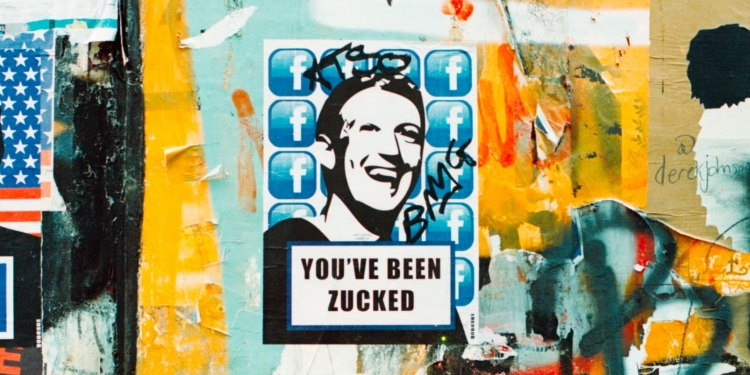Not a day has gone by without hearing about a Malaysian getting scammed online. One of the contributing channels is Facebook and we’ve highlighted several examples of scam ads impersonating mainstream news sites, government officials and various brands on its platform. Personally, the situation has gotten so bad that almost one out of every four ads I see are scam ads impersonalting news sites promote online gambling. It is clear that Facebook is not adhering to its own advertising policies and they are prioritising ad revenues over the safety of Malaysian users.
Facebook approves fake ads without basic checks
Back in April, we highlighted a high frequency of ads impersonating mainstream news websites such as the New Straits Times, The Star and Sin Chew. These ads promote quick ways to earn high-income or getting luxury goods, and are linked to gambling websites. Facebook Malaysia is well aware of this problem and even The Star has urged Facebook to take more concrete steps to prevent the proliferation of pages impersonating established, credible brands to sponsor misleading ads and scam sites on its social media platforms.
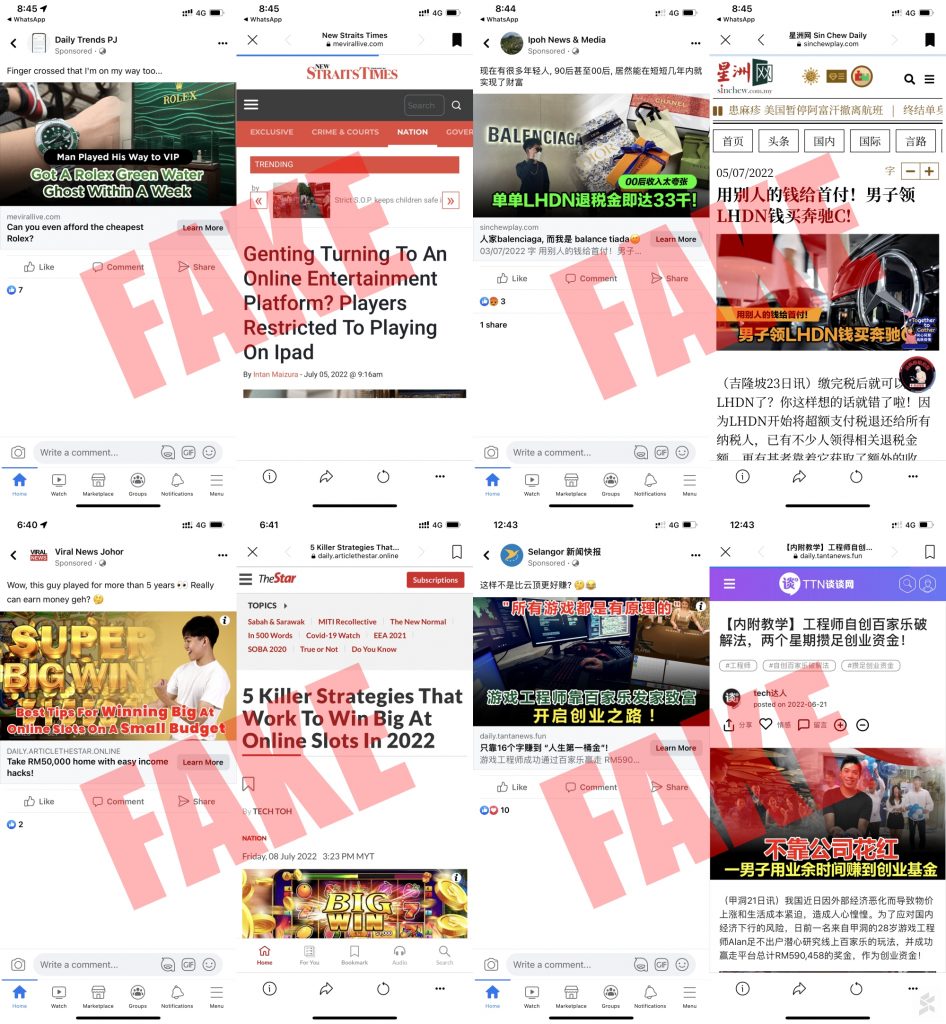
In the past few weeks, it seems that the same advertiser has double down its efforts and we are seeing even more ads immitating even more websites. Similar to the KFC scam ads, these ads are created from newly created Facebook pages with very few likes or followers.
By right, all ads on Facebook has to go through a stringent review process which may take days to approve to ensure that it complies with their ad policy. Any digital literate staff at Facebook Malaysia could have easily identified these scam ads but yet they are still allowed to run on their platform and despite being reported to them repeatedly.
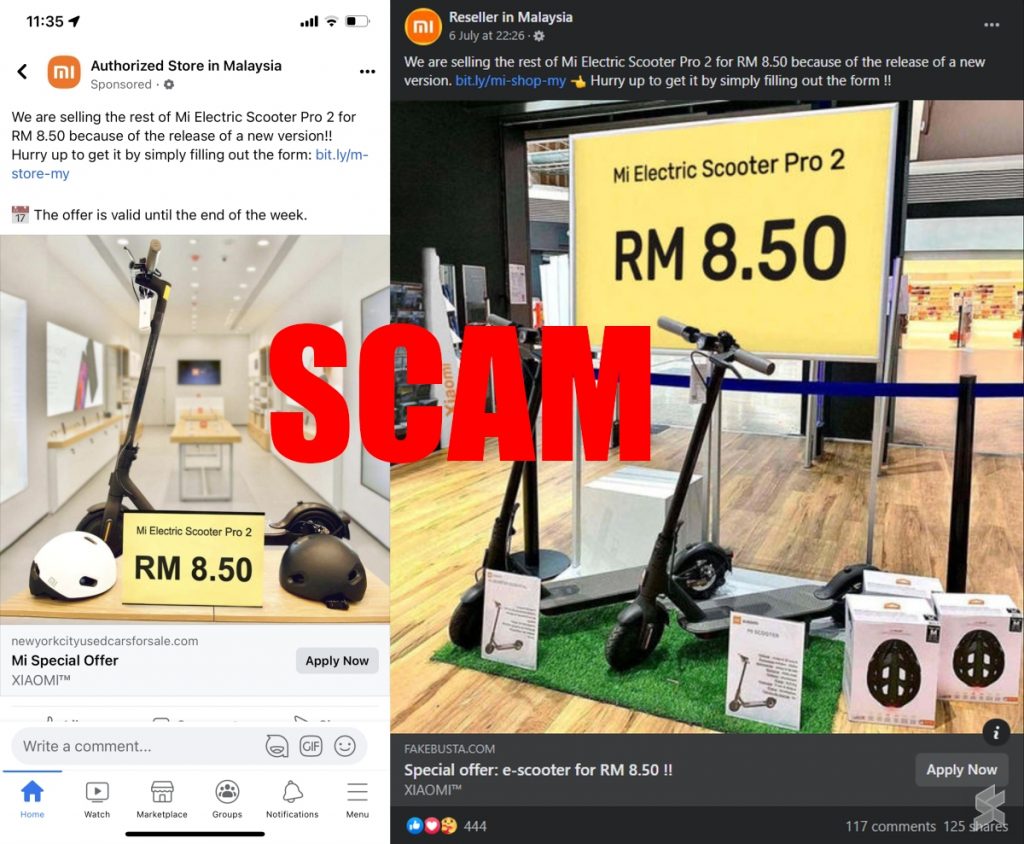
Another major issue are ads promoting fake or scam deals ranging from Xiaomi electric scooters, Smart TAG and Sony PlayStation 5. As covered by SoyaCincau BM recently, there’s a syndicate that’s distributing malicious apps through Facebook ads promoting discounted maid services. A victim had lost over RM18,000 after downloading the dodgy app that was sent by the scammer.
Facebook doesn’t give a damn about user reports
Allowing scam ads to run on their platform is bad enough but the biggest issue with Facebook is the lack of action when reports are made about scam ads. We have been diligently reporting every single scam ad we see and more than 95% of the time, these ads were not taken down. Either we get a response that they are facing a “technical issue” or they couldn’t find anything wrong after using “technology” to review the reports.
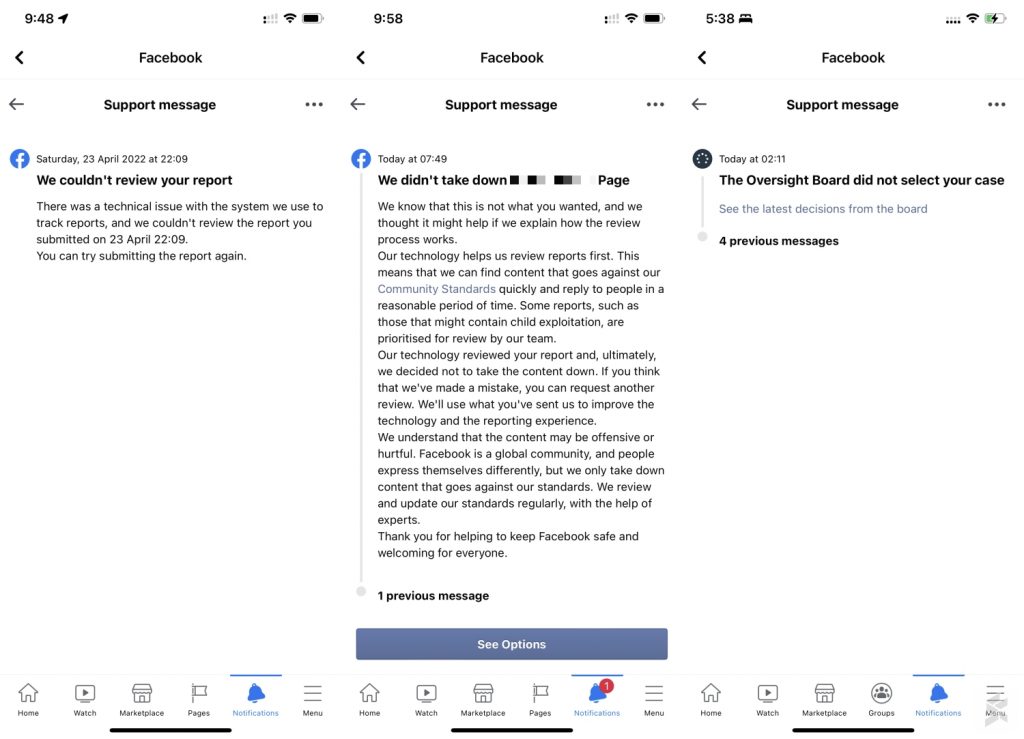
If you’re lucky, you might get an option to raise the issue to an Oversight Board which is a supposedly independent group to review their difficult and significant content decisions they make. However, our attempts to report to the Oversight Board have failed as they didn’t even get the chance to look into the report.
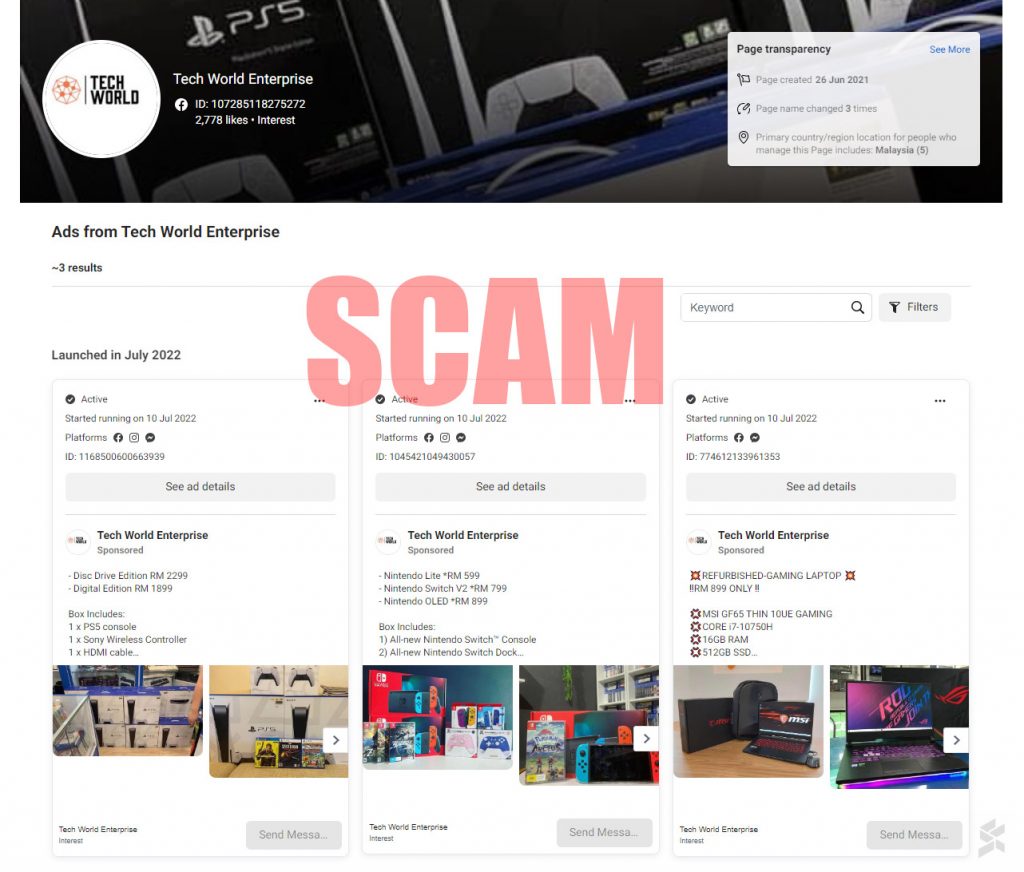
As mentioned earlier, these are Facebook pages that are created with the intention of conning consumers out of their money. One of them is a Facebook page that claims to sell PS5, Nintendo Switches and refurbished gaming laptop. The page has been reported to Facebook as a scam and several victims have already filed police reports. At the time of writing, the page is still up and are currently running ads on Facebook’s platform to target more victims.
KKM ingin menegaskan bahawa KKM tidak pernah memperakukan mana-mana produk atau makanan yang boleh menggantikan ubatan termasuk insulin untuk merawat Diabetes seperti didakwa oleh Facebook page “Ainalienshop-TW”
— KKMalaysia🇲🇾😷 (@KKMPutrajaya) May 6, 2022
Gambar yang digunakan merupakan gambar yang telah diubahsuai. pic.twitter.com/4aFwC9zGBL
Back in May, the Ministry of Health even issued a PSA about a Facebook ad that gives the impression that the Minister of Health and the Health Director General have endorsed a diabetic medicine. Despite the ad being reported by the government, it took Facebook days to take down the ad which shows the lack of urgency and disregard to public safety.
It is clear that Facebook is not taking scams seriously as they are benefiting from scam ads. The longer these ads run, the more revenue they get despite all the complaints submitted by their users. If Facebook has the technology to restrict ads with image containing more than 20% text, surely a multi-billion dollar company could put in resources to stop these scam ads from running in the first place.
I’ve personally reported dozens of scam ads to Facebook Malaysia representatives. They could have easily blocked the domain names if they are serious about tackling online scams.
3 things Annuar Musa could do to reduce scams on Facebook
It is baffling that a big tech platform such as Facebook is allowed to operate unchecked with unlimited freedom in Malaysia. With the rise of scams, it is time for the Communications and Multimedia Ministry and the Malaysian Communications and Multimedia Commission (MCMC) to step up their efforts to reprimand Facebook for helping scammers to target Malaysians.
Make Facebook liable for scams amplified by its ad platform
The Australian Competition and Consumer Commission (ACCC) has sued Facebook’s parent company Meta for engaging in false, misleading or deceiptive conduct by publishing scam advertisements featuring prominent Australian public figure. Not only they found Meta’s conduct in breach of the Australian laws but also alleged to have aided and abetted or was knowingly concerned in false or misleading conduct and representations by the advertisers.
The ACCC alleged the ads contained links which took Facebook users to a fake media article that included quotes attributed to the public figure featured in the ad endorsing a cryptocurrency or money-making scheme. Users were then invited to sign up and were subsequently contacted by scammers who used high pressure tactics, such as repeated phone calls, to convince users to deposit funds into the fake schemes.
The ACCC believes that Meta is responsible for these ads that it publishes on its platform and these ads generate subtantial revenue for Facebook. It alleged that Meta was aware of such scam ads but did not take sufficient steps to address the issue.
ACCC Chair Rod Sims said “We allege that the technology of Meta enabled these ads to be targeted to users most likely to engage with the ads, that Meta assured its users it would detect and prevent spam and promote safety on Facebook, but it failed to prevent the publication of other similar celebrity endorsement cryptocurrency scam ads on its pages or warn users.”
He added, “Apart from resulting in untold losses to consumers, these ads also damage the reputation of the public figures falsely associated with the ads. Meta failed to take sufficient steps to stop fake ads featuring public figures, even after those public figures reported to Meta that their name and image were being featured in celebrity endorsement cryptocurrency scam ads.”
It is high time for Malaysia to take a similar step to make Facebook responsible for allowing such ads on their platform.
If such scam or offending ads were to appear on Malaysian TV, Radio, print or online platforms, the Malaysian authority and regulators would have taken swift action to fine or have their licences suspended or revoked. Big Tech including Facebook should be made to follow the same rules and codes of advertising as other forms of media in Malaysia. Some form of regulation is needed so that Facebook will think twice before accepting ad money from scammers.
Enforce mandatory vetting of ads
Facebook has local offices all over the world and they have an official presence in Malaysia as well. In most markets around the world, they have dedicated teams to engage with local businesses to push for more Facebook ad sales. Since advertising is their huge revenue generator, companies such as Facebook should be required to conduct manual review of ads to ensure that it complies with the local laws and their own ad policy.
At the very least, Facebook should have a dedicated local ad review team to check through all new ads on their platform. This has to be a team of Malaysians who can understand the local context and can easily identify if a local public figure or brand is being misused to promote a scam. From what we’ve observed, most of scam ads are typically created by newly created Facebook pages and basic checks would have prevented such ads from going live in the first place. While digital literacy is important among users, it is also Facebook’s responsibility to ensure all ads on their platform are safe for its users. Facebook does run digital education campaigns from time to time but it is unfair to shift the responsibility to users while Facebook is making billions of dollars annually from ads.
Dedicated support team to act on scams and fake ads
One of the biggest issue is the lack of action by Facebook when an ad is reported. The government should make Facebook Malaysia set up local dedicated support team with a mandatory turnaround time to act on scams. If Facebook fails to act on scam ads within a stipulated time, they should be penalised for the delay as more Malaysians are at risk of getting scammed if the ads continue to run. If Facebook can set up offices with ad sales team, surely they can afford to form a local team to handle complaints and moderation of ads.
Does Malaysia have sufficient laws and regulation to tackle online scams?
Communications and Multimedia Minister Tan Sri Annuar Musa had said in April that although Section 233 of the Communications and Multimedia Act 1998 could be used against offenders, it is not effective in checking contents uploaded on overseas platforms.
He said if someone uploads on Facebook and Twitter, the Malaysian Communications and Multimedia Commission has no power to take it down. He added in order to ask for help from overseas-based platform, they would need to do preliminary investigations before bringing it to the Attorney-General’s Chambers to seek coopoeration of the country concerned.
The upcoming Parliamentary session that’s happening next week could be the perfect time to push for an amendment. Back in 2017, the MCMC didn’t hesitate to ban Steam for not complying with the MCMC’s request to remove a game that was deemed offensive. Perhaps it is time for Annuar Musa’s ministry and the MCMC to show similar enthusiasm to tackle online scams and this should cover all big tech online platforms including eCommerce and app stores.
So what can you do as a Malaysian? You can highlight this issue to your local Member of Parliament or tag Annuar Musa on his social platform. We can also do our part to educate our friends and family to be wary about Facebook and how they are allowing scammers to run ads on their platform.
[ IMAGE SOURCE ]

